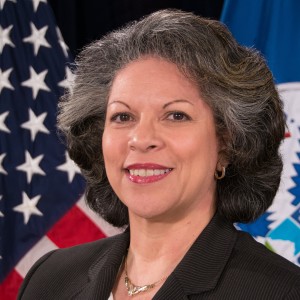

Soraya Correa, the chief procurement officer at DHS, said the agency is emphasizing to acquisition employees and program managers the importance of addressing...
The Homeland Security Department is certifying employees who are innovative.
A new program awards “digi-badges” to those employees who are putting into practice what they are learning about using digital services to improve DHS’ mission.
Soraya Correa, the chief procurement officer at DHS, said the agency is emphasizing to acquisition employees and program managers the importance of addressing challenges in a different way.
“I think it’s a good way to encourage people to continue to participate in the webinars, to continue to be innovative and to continue to learn because that’s what this is really about,” Correa said in an exclusive interview with Federal News Radio. “It’s staying on top of the business, making sure we understand how technology is changing, how we are trying to change procurement and how we can do business better. Good government is important to us.”

Correa said the goal of “digi-badges” is to recognize those early adopters and create a “trickle-down” effect around digital services.
DHS’ first step in this effort was to name Eric Cho as its acquisition innovation advocate. The Office of Management and Budget required every agency to name an advocate in its March 2016 memo. Correa said DHS then went one step further by asking each of DHS’ component agencies to name acquisition innovators.
“We have an acquisition innovation acquisition council that is meeting on a regular basis to talk about where we can innovate. We are challenging them to bring us innovations and ideas they have for how we can innovate in each of the components to perhaps identify three procurements where we will try something new,” she said. “It’s about challenging them, but you can’t force it. If you force it, you probably will not be successful. It really has to come naturally. Through the training, we think we induce that.”
DHS launched its Procurement Innovation Lab (PIL) about a year ago to experiment with ways to improve both acquisition processes and specific projects themselves. Correa said the PIL has completed nine projects and is working on nine others.
One recent project focused on reducing the backlog of low-risk, low-cost contracts that need to be closed out.
“I still want them to focus on the actual procurement process. My goal is to simplify, streamline and make it a little more efficient to accomplish our buying based on what we are buying. Obviously, not everything can be done in 30 days and not everything should take six months,” Correa said. “It’s about getting that lead time down to a very manageable level, a little bit more predictable level and to make sure that the innovations that we have, people feel comfortable using them and understanding them.”
A key piece of that innovation effort is working closely with industry as well.
To that end, DHS is hosting its third reverse industry day on Jan. 10 in Washington.
“In support of Acquisition Innovations in Motion (AIiM) and the Secretary’s Unity of Effort initiative, this learning event is designed to improve DHS’ understanding of industry processes and methodologies related to identifying and tracking DHS opportunities, pricing, proposal preparation, and various contract performance considerations,” DHS wrote in the FedBizOpps notice from November. “The event will provide DHS’ acquisition workforce an opportunity to learn about the issues that are most important to industry when doing business with the department.”
DHS held two previous reverse industry days in November 2015 and May 2016.
Additionally, DHS held two strategic industry conversations in February and October 2016.
“The goal of the strategic industry conversation is to have just a high-level discussion with industry about topics of industry. Whether it’s talking about our strategic priorities, talking about high-level program requirements, where we envision where we are going with a particular program like aviation security or biometrics and then to also talk about some of our business processes in areas of interest where industry wants to learn more, like our strategic sourcing and category management initiatives or our small business initiatives. The purpose of the strategic industry conversation was to bring in our professionals here at DHS and hook them up with industry and have a good dialogue with industry about the things we are doing.”
Correa said the biggest takeaway from the strategic industry conversation is DHS needs to communicate with industry earlier and often to help contractors understand the agency’s goals.
“The biggest accomplishment that comes out of this industry conversation is understanding each other better. That’s critical, especially for an agency like ours who has such a difficult and ever-changing mission,” she said. “I think it’s really important that we have this dialogue going so that we are learning from one another and industry has a better understanding of the problems we are trying to solve.”
Copyright © 2025 Federal News Network. All rights reserved. This website is not intended for users located within the European Economic Area.
Jason Miller is executive editor of Federal News Network and directs news coverage on the people, policy and programs of the federal government.
Follow @jmillerWFED


